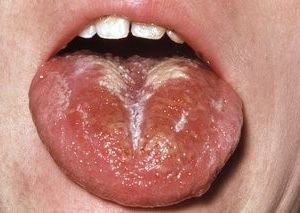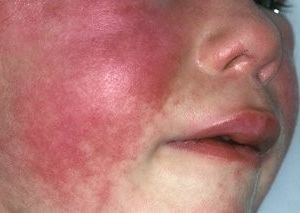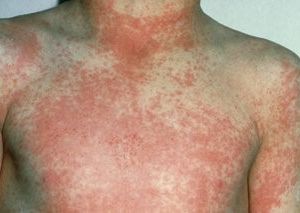Scarlet fever and Group A Strep
Scarlet fever is an illness is caused by a bug called group A streptococcus, which is found on the skin and in the throat. Scarlet fever mostly affects children and can easily spread to other people.
Generally, scarlet fever is much less common than it used to be but in last few years there have been a number of outbreaks. It is important that children with scarlet fever are assessed by a healthcare professional so that they can be started on antibiotics.
The scarlet fever rash often begins with small spots on the body that then spread to the neck, arms and legs over the next 1 to 2 days. The rash may be harder to see on darker skin tones. It often feels like 'sandpaper' but is not itchy..
Your child may also have a:
- Sore throat or Tonsillitis
- Fever (temperature of 38oC or above)
- Painful, swollen glands in the neck
- A red tongue (strawberry tongue)



If your child also has a runny nose with their sore throat, it makes a diagnosis of scarlet fever and Group A strep less likely.
When should you worry?
If your child has any of the following:
- Breathing very fast, too breathless to talk, eat or drink
- Working hard to breathe, drawing in of the muscles below the rib or noisy breathing (grunting)
- Breathing that stops or pauses
- Is pale, blue, mottled or feels unusually cold to touch
- Difficult to wake up, very sleepy or confused
- Weak, high-pitched cry or can’t be settled
- Has a fit (seizure)
- Has a rash that does go away with pressure (see the 'Glass Test')
- Is under 3 months old with temperature more than 38°C or under 36°C (unless fever in the 48 hours following vaccinations and no other red features)
You need urgent help.
Go to the nearest Hospital Emergency (A&E) Department or phone 999
If your child has any of the following:
-
Unable to swallow saliva
-
Painful, red swollen neck glands
-
Painful, swollen joints
-
Puffy face or eyelids
-
Dark coca-cola coloured wee (urine)
-
Develops red lips or a red tongue
-
Develops a lot of skin peeling
-
Breathing a bit faster than normal or working a bit harder to breathe
-
Dry skin, lips or tongue
-
Not had a wee or wet nappy in last 8 hours
-
Poor feeding in babies (less than half of their usual amount)
-
Irritable (Unable to settle them with toys, TV, food or hugs even after their fever has come down)
-
Not using or putting weight on an arm, leg, hand or foot.
-
Complaining of severe pain that is not improving with painkillers
-
Is 3-6 months old with temperature 39°C or above (unless fever in the 48 hours following vaccinations and no other red or amber features)
-
Temperature of 38°C or above for more than 5 days or shivering with fever (rigors)
-
Temperature less than 36°C in those over 3 months
-
Getting worse or you are worried about them
You need to contact a doctor or nurse today.
Please ring your GP surgery or call NHS 111 - dial 111
If symptoms persist for 4 hours or more and you have not been able to speak to either a member of staff from your GP practice or to NHS 111 staff, recheck that your child has not developed any red features
If your child has none of the above:
-
Watch them closely for any change and look out for any red or amber symptoms
-
If your child has any other symptoms associated with their fever, you may want to look at the information on sore throat, cough, earache, diarrhoea and vomiting or tummy ache or our other pathways.
-
Additional advice is also available for families for help cope with crying in otherwise well babies
-
If your child has a long term condition or disability and you are worried please
contact your regular team or follow any plans that they have given you.
Self care
Continue providing your child’s care at home. If you are still concerned about your child, call NHS 111 – dial 111
This guidance has been reviewed and adapted by healthcare professionals across North East and North Cumbria with consent from the Hampshire development groups.
How long will your child's symptoms last?
Scarlet fever last for around 1 week. If you do not take antibiotics, you can spread the infection for 2-3 weeks after your symptoms start.
Important
Keep your child away from nursery or school for at least 24 hours after starting antibiotic treatment. Adults with scarlet fever should also stay off work for at least 24 hours after starting treatment.
Self-care
Many of the symptoms of scarlet fever can be relieved using some simple self-care measures, such as:
- drinking plenty of cool fluids
- eating soft foods (if your throat is painful)
- taking paracetamol to bring down a high temperature/distress
- using calamine lotion or antihistamine tablets to relieve itching
Is Scarlet Fever dangerous?
Most cases of scarlet fever don't cause problems, particularly if the condition is properly treated.
Rarely, the infection can spread to other parts of the body and cause more serious infections such as chest infections, bone and joint infections and sepsis.
How to avoid spreading Scarlet fever?
Scarlet fever is very contagious and can easily spread to other people. To reduce the chance of spreading Scarlet fever:
Do:
- wash your hands often with soap and water
- use tissues to trap germs from coughs or sneezes
- bin used tissues as quickly as possible
Don’t:
- do not share cutlery, cups, towels, clothes, bedding or baths with anyone who has symptoms of scarlet fever
My child has been in close contact with someone with Strep A - do they need antibiotics?
If your child has been in close contact with a case of scarlet fever or strep throat, they do not need to be treated with antibiotics unless they are showing signs of infection (severe tonsillitis with fever in the absence of a runny nose or signs of scarlet fever). Only in exceptional circumstances will the local public health team recommend for an entire school class to be treated with antibiotics.
Where should you seek help?
- If it is non-urgent, speak to your local pharmacist or health visitor.
- If your child has any of the above features, urgently see your GP. For an urgent out-of-hours GP appointment, call NHS 111.
- You should only call 999 or go to your nearest A&E department in critical or life threatening situations.
Pharmacists are experts in many aspects of healthcare and can offer advice on a wide range of long-term conditions and common illnesses such as coughs, colds and stomach upsets. You don’t need an appointment and many have private consultation areas, so they are a good first port of call. Your pharmacist will say if you need further medical attention.
Sound advice
- Visit a pharmacy if your child is ill, but does not need to see a GP.
- Remember that if your child's condition gets worse, you should seek further medical advice immediately.
- Help your child to understand - watch this video with them about going to the pharmacy.
For information on common childhood illnesses go to What is wrong with my child?
Pharmacists are experts in many aspects of healthcare and can offer advice on a wide range of long-term conditions and common illnesses such as coughs, colds and stomach upsets. You don’t need an appointment and many have private consultation areas, so they are a good first port of call. Your pharmacist will say if you need further medical attention.
Sound advice
- Visit a pharmacy if your child is ill, but does not need to see a GP.
- Remember that if your child's condition gets worse, you should seek further medical advice immediately.
- Help your child to understand - watch this video with them about going to the pharmacy.
For information on common childhood illnesses go to What is wrong with my child?
Health visitors are nurses or midwives who are passionate about promoting healthy lifestyles and preventing illness through the delivery of the Healthy Child Programme. They work with you through your pregnancy up until your child is ready to start school.
Health Visitors can also make referrals for you to other health professionals for example hearing or vision concerns or to the Community Paediatricians or to the child and adolescent mental health services.
Contact them by phoning your Health Visitor Team or local Children’s Centre.
Sound advice
Health visitors also provide advice, support and guidance in caring for your child, including:
- Breastfeeding, weaning and healthy eating
- Exercise, hygiene and safety
- Your child’s growth and development
- Emotional health and wellbeing, including postnatal depression
- Safety in the home
- Stopping smoking
- Contraception and sexual health
- Sleep and behaviour management (including temper tantrums!)
- Toilet training
- Minor illnesses
For more information watch the video: What does a health visitor do?
Health visitors are nurses or midwives who are passionate about promoting healthy lifestyles and preventing illness through the delivery of the Healthy Child Programme. They work with you through your pregnancy up until your child is ready to start school.
Health Visitors can also make referrals for you to other health professionals for example hearing or vision concerns or to the Community Paediatricians or to the child and adolescent mental health services.
Contact them by phoning your Health Visitor Team or local Children’s Centre.
Sound advice
Health visitors also provide advice, support and guidance in caring for your child, including:
- Breastfeeding, weaning and healthy eating
- Exercise, hygiene and safety
- Your child’s growth and development
- Emotional health and wellbeing, including postnatal depression
- Safety in the home
- Stopping smoking
- Contraception and sexual health
- Sleep and behaviour management (including temper tantrums!)
- Toilet training
- Minor illnesses
For more information watch the video: What does a health visitor do?
Midwives provide advice, care and support for women and their babies during pregnancy, labour and the early postnatal period. They provide health education and parenting advice until care is transferred to a health visitor. This usually happens when your baby is about 2 weeks old.
Sound Advice
A midwife is an expert in normal pregnancy and birth.
Midwives provide advice, care and support for women and their babies during pregnancy, labour and the early postnatal period. They provide health education and parenting advice until care is transferred to a health visitor. This usually happens when your baby is about 2 weeks old.
Sound Advice
A midwife is an expert in normal pregnancy and birth.
GPs assess, treat and manage a whole range of health problems. They also provide health education, give vaccinations and carry out simple surgical procedures. Your GP will arrange a referral to a hospital specialist should you need it.
Sound advice
You have a choice of service:
- Doctors/GPs can treat many illnesses that do not warrant a visit to A&E.
- Help your child to understand – watch this video with them about visiting the GP or going to a walk in centre
For information on common childhood illnesses go to What is wrong with my child?
GPs assess, treat and manage a whole range of health problems. They also provide health education, give vaccinations and carry out simple surgical procedures. Your GP will arrange a referral to a hospital specialist should you need it.
Sound advice
You have a choice of service:
- Doctors/GPs can treat many illnesses that do not warrant a visit to A&E.
- Help your child to understand – watch this video with them about visiting the GP or going to a walk in centre
For information on common childhood illnesses go to What is wrong with my child?
If you’re not sure which NHS service you need, call 111. An adviser will ask you questions to assess your symptoms and then give you the advice you need, or direct you straightaway to the best service for you in your area.
Sound advice
Use NHS 111 if you are unsure what to do next, have any questions about a condition or treatment or require information about local health services.
For information on common childhood illnesses go to What is wrong with my child?
If you’re not sure which NHS service you need, call 111. An adviser will ask you questions to assess your symptoms and then give you the advice you need, or direct you straightaway to the best service for you in your area.
Sound advice
Use NHS 111 if you are unsure what to do next, have any questions about a condition or treatment or require information about local health services.
For information on common childhood illnesses go to What is wrong with my child?
A&E departments provide vital care for life-threatening emergencies, such as loss of consciousness, suspected heart attacks, breathing difficulties, or severe bleeding that cannot be stopped. If you’re not sure it’s an emergency, call 111 for advice.
Sound advice
A&E departments provide vital care for life-threatening emergencies, such as loss of consciousness, suspected heart attacks, breathing difficulties, or severe bleeding that cannot be stopped. If you’re not sure it’s an emergency, call 111 for advice.
Sound advice
School nurses care for children and young people, aged 5-19, and their families, to ensure their health needs are supported within their school and community. They work closely with education staff and other agencies to support parents, carers and the children and young people, with physical and/or emotional health needs.
Contacting the School Nurse
Primary and secondary schools have an allocated school nurse – telephone your child’s school to ask for the contact details of your named school nurse.
There is also a specialist nurse who works with families who choose to educate their children at home.
Sound Advice
Before your child starts school your health visitor will meet with the school nursing team to transfer their care to the school nursing service. The school nursing team consists of a school nursing lead, specialist public health practitioners and school health staff nurses.
They all have a role in preventing disease and promoting health and wellbeing, by:-
- encouraging healthier lifestyles
- offering immunisations
- giving information, advice and support to children, young people and their families
- supporting children with complex health needs
Each member of the team has links with many other professionals who also work with children including community paediatricians, child and adolescent mental health teams, health visitors and speech and language therapists. The school health nursing service also forms part of the multi-agency services for children, young people and families where there are child protection or safeguarding issues.
School nurses care for children and young people, aged 5-19, and their families, to ensure their health needs are supported within their school and community. They work closely with education staff and other agencies to support parents, carers and the children and young people, with physical and/or emotional health needs.
Contacting the School Nurse
Primary and secondary schools have an allocated school nurse – telephone your child’s school to ask for the contact details of your named school nurse.
There is also a specialist nurse who works with families who choose to educate their children at home.
Sound Advice
Before your child starts school your health visitor will meet with the school nursing team to transfer their care to the school nursing service. The school nursing team consists of a school nursing lead, specialist public health practitioners and school health staff nurses.
They all have a role in preventing disease and promoting health and wellbeing, by:-
- encouraging healthier lifestyles
- offering immunisations
- giving information, advice and support to children, young people and their families
- supporting children with complex health needs
Each member of the team has links with many other professionals who also work with children including community paediatricians, child and adolescent mental health teams, health visitors and speech and language therapists. The school health nursing service also forms part of the multi-agency services for children, young people and families where there are child protection or safeguarding issues.



